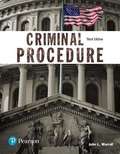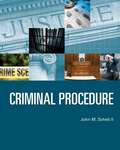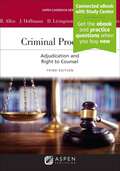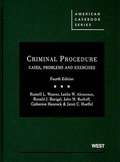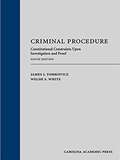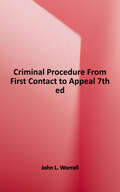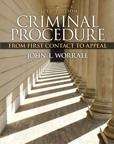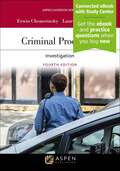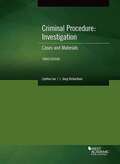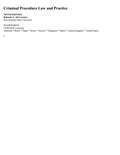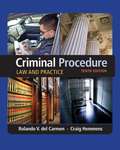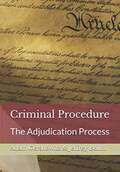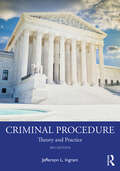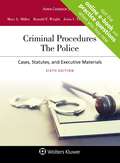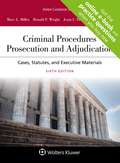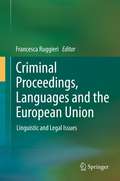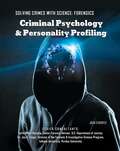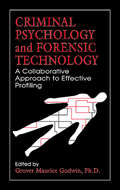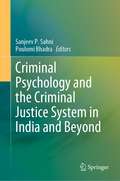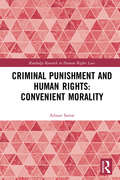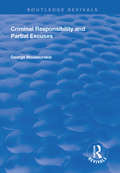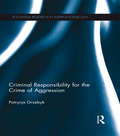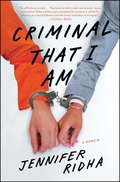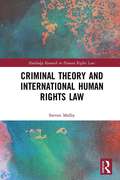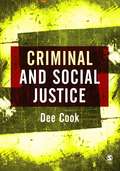- Table View
- List View
Criminal Procedure, 3rd Edition (The Justice Series)
by John L. WorrallCriminal Procedure, Third Edition, provides an affordable, thought-provoking look at criminal procedure that uses clear writing and eye-catching visuals to get your students straight to the important concepts. By focusing on these core concepts, students will gain true understanding of the material, without becoming overwhelmed with unnecessary information. The book's conversation-starting pedagogy encourages active participation in learning, moving students beyond memorization by engaging them in the latest research findings and current events shaping the field. <P><P>Criminal Procedure, Third Edition, is also available via Revel™, an interactive learning environment that enables students to read, practice, and study in one continuous experience.
Criminal Procedure, Seventh Edition
by John M. SchebClear and extremely readable, CRIMINAL PROCEDURE, Seventh Edition, is packed with current cases and real-world examples. The text couples a classic organization and traditional presentation of case law with cutting-edge coverage of recent trends in law and procedure. The authors' combined academic and practical legal experience gives you firsthand insights into the American legal system. Utilizing extensive case material, the text covers the historical background of criminal procedure and includes the latest Supreme Court decisions and other developments in criminal justice today.
Criminal Procedure: Adjudication And The Right To Counsel (Aspen Casebook Ser.)
by Ronald J. Allen Joseph L. Hoffmann Debra A. Livingston Andrew D. Leipold Tracey L. MearesCriminal Procedure: Adjudication and Right to Counsel, Third Edition is designed for the criminal procedure course focused on the pretrial, trial, and post-trial processes. It covers prosecutorial decision making, pretrial release, grand juries, speedy trial rights, venue, joinder and severance, discovery, guilty pleas and plea bargains, trials, sentencing, appeals, and postconviction challenges. The book is designed to be used with the annual supplement that contains the statutes and rules covered in the course. This text is derived from the successful casebook Comprehensive Criminal Procedure by the same experienced author team.
Criminal Procedure: Cases, Problems and Exercises (4th edition)
by Russell L. Weaver Leslie W. AbramsonThe fourth edition contains thought-provoking problems, and is designed to encourage classroom discussion, and help students effectively learn criminal procedure principles. Ideally suited for a one-semester course, this casebook contains all the essential decisions without being overwritten or so massive as to be unwieldy. in addition, the new edition is completely up-to-date containing the latest decisions from the United States Supreme Court, as well as problems based on important lower court decisions. Criminal Procedure: Cases, Problems and Exercises is unique because the authors actively seek to place students in situations that they are likely to encounter in practice, and asks students to think about how they might handle those situations (e. g. , what does a lawyer do when asked to represent a client at a lineup?). for this new edition, the authors have added a significant number of new problems. They have also added important cases from the United States Supreme Court's recent terms. (American Casebooks)
Criminal Procedure: Constitutional Constraints Upon Investigation and Proof
by Welsh S. White James J. TomkoviczThe ninth edition of this criminal procedure casebook incorporates significant rulings of the Court since the last edition―most notably, <i>Carpenter v. United States</i> (whether acquisition of historical cell site location records is a search), <i>Collins v. Virginia</i> (whether the automobile exception allows warrantless entries onto curtilage), <i>Kansas v. Glover</i> (whether knowledge that a vehicle’s registered owner has a revoked license gives rise to a reasonable suspicion justifying a stop), and <i>Byrd v. United States</i> (whether a person not on a rental car contract but permitted to use a car by the renter has “standing” to object to a search). <p><p>The text has been streamlined with the hope of assisting instructors pressed for time. Chapter Six (Entrapment) has been eliminated and a number of previously main cases have been reduced to note status. Finally, the problems for most of the chapters have been refreshed with a sampling of cutting\-edge rulings by lower courts.
Criminal Procedure: From First Contact To Appeal
by John L. WorrallCriminal Procedure is an authentic study of criminal procedure, for both the novice reader and the aspiring law student. It provides a comprehensive introduction to criminal procedure, from a first encounter with the police, all the way through to appeal. Assuming no legal expertise, the text connects criminal procedure cases to real-life implications through innovative pedagogy. For example, decision-making exercises position you as a judge and challenge you to decide cases based on the facts presented. Conversational and easy to read, the 7th Edition adds Supreme Court decisions through the 2021 -22 term and analyzes their impact on criminal and legal processes. Topics covered include qualified immunity, pretrial detentions, victim impact statements and warning shots, among many others.
Criminal Procedure: From First Contact to Appeal (Fifth Edition)
by John L. WorrallThis comprehensive text uses a real world focus to cover all of criminal procedure, from first contact to appeal. Criminal Procedure: From First Contact to Appeal, 5e is a comprehensive introduction to criminal procedure, from first contact with the police, all the way through to appeal. The text is divided into five parts: (1) Introduction; (2) Search and Seizure; (3) Interrogations, Confessions, and Identification Procedures; (4) The Beginnings of Formal Proceedings; and (5) Trial, Conviction, and Beyond. The latter two topics are rarely covered in conventional criminal procedure books, particularly at the level of detail found in this text. This book presupposes no legal expertise, connects criminal procedure cases to the real world through innovative pedagogy, and encourages students through numerous decision making exercises to be critical thinkers by putting them in the position of judge. Teaching and Learning Experience This book presents a comprehensive introduction to criminal procedure, thoroughly presenting basic legal concepts and issues in a conversational written style and tone. It provides: Real World Focus: The text contains actual legal documents and excerpts from official policy manuals of police departments and other criminal justice agencies around the United States Clear, up-to-date coverage: Sequentially organized text is laden with the latest court cases and practical examples and illustrations Outstanding Pedagogical Features: Provides students with tools to master key concepts and content
Criminal Procedure: Investigation (Aspen Casebook)
by Erwin Chemerinsky Laurie L. LevensonWritten in a student-friendly manner, the fourth edition of Criminal Procedure: Investigation eschews excessive reliance on rhetorical questions and law review excerpts in favor of comprehensive exploration of black letter law and current policy issues. Authored by a pair of well-respected criminal and constitutional law scholars, Criminal Procedure: Investigation utilizes a chronological approach that guides students through criminal procedure doctrine, from rules governing searches and seizures to the right to counsel. <p><p>In addition to presenting the perspectives from various stakeholders (e.g. prosecutors, defense counsel, judges, police, and victims), the authors take care to provide students with useful, practice-oriented materials, including pleadings and motions papers. Criminal Procedure: Investigation not only employs a systemic approach that takes students through each step of criminal investigation, but also introduces issues at the forefront of modern criminal procedure debates. <P><P> New to the Fourth Edition: <p>• The Fourth Edition has been thoroughly updated to provide analysis of important, recent decisions in the area of Criminal Procedure, including several decisions from the Supreme Court’s most recent terms and discussion of policy issues at the forefront of criminal law. <p>• New sections on excessive police force and on damage remedies for Fourth Amendment violations. <p>• New cases include Carpenter v. United States (application of the Fourth Amendment to cellular location information); Torres v. Madrid (what is a seizure); Virginia v. Collins (automobile exception to the Fourth Amendment); United States v. Byrd (exclusionary rule case about the ability of an unauthorized driver of a rental car to challenge a police search); and Kansas v. Glover (reasonable suspicion for a car stop)
Criminal Procedure: Investigation, Cases and Materials ((American Casebook Series))
by Cynthia Lee L. RichardsonCriminal Procedure: Investigation, Cases and Materials (American Casebook Series)
Criminal Procedure: Law And Practice
by Rolando V. Del CarmenPacked with examples from real-world situations faced by today's law enforcement professionals, CRIMINAL PROCEDURE: LAW AND PRACTICE, 9e gives you a practical and authoritative look at the most current guidelines in criminal procedure. Comprehensive and accurate without bogging you down in unnecessary details, the text includes cutting-edge coverage of the law on arrests, searches and seizures, vehicle stops, use of force, interrogations, and line-ups. It also discusses current topics on racial profiling, DNA evidence, plea bargaining, seizures of text/email messages, technology, the USA Patriot Act, and much more. Long known for its relevance to law enforcement, it features interesting case briefs, sample police forms, hypothetical cases, and coverage of the most recent Supreme Court rulings.
Criminal Procedure: Law and Practice
by Craig Hemmens Rolando V. del CarmenPacked with examples from real-world situations faced by today's law enforcement professionals, Criminal Procedure: Law and Practice, 10th Edition gives readers a practical and authoritative look at the most current guidelines in criminal procedure. Comprehensive and accurate without bogging readers down in unnecessary details, the text includes cutting-edge coverage of the law as it relates to arrests, searches and seizures, vehicle stops, use of force, interrogations, and line-ups. It also discusses current topics such as racial profiling, DNA evidence, plea bargaining, seizures of text/email messages, and many others. Interesting case briefs, sample police forms, hypothetical cases, and coverage of the most recent Supreme Court rulings keep the text as relevant as ever. Its clear, reader-friendly presentation makes law enforcement concepts easy to understand and apply.
Criminal Procedure: The Adjudication Process
by Jeffrey Bellin Adam GershowitzThis book is what you might think of as a Marie Kondo version of criminal procedure: happiness by decluttering. Many of the leading criminal procedure textbooks are crowded with pages upon pages of notes and unanswered (and sometimes unanswerable) hypotheticals. We understand this impulse. The field of criminal procedure raises countless interesting questions that scholars would love to explore in great depth. However, we do not believe that law school casebooks should be designed for scholars. Rather, law school casebooks are for students who do not yet have an elementary understanding of the subject. After all, that is why they are in the class! To use another metaphor, we intend this book to be about the forest, not the trees, so that students can see the big picture more clearly.This criminal procedure textbook is first and foremost designed to be accessible to students. How did we do that? First, we have largely eliminated notes and questions except where they directly reinforce the doctrine or where they eliminate the need to include a lengthy excerpt. For instance, the double jeopardy chapter does not have notes about fascinating (but esoteric) mistrial issues.
Criminal Procedure: Theory and Practice
by Jefferson L. IngramCriminal Procedure: Theory and Practice, 3rd Edition, presents a broad overview of criminal procedure as well as a detailed analysis of specific areas of the law that require specialized consideration. The third edition provides students with an updated, comprehensive text written in reader-friendly language to introduce them to the field of criminal procedure. Significant edited legal cases are integrated into each chapter, and comments, notes, and questions accompany each case. This edition features a new chapter covering searches of Internet-connected devices and electronic devices that may store personally connected data. The chapter “The Internet of Things” introduces search and seizure concepts related to electronics. In addition, a section at the conclusion of each chapter, “How Would You Decide,” allows readers to examine the facts of a real case that contain some of the important concepts form each chapter. The reader can compare the individual's personal resolution of the case with the way the actual court determined the issue. Using a balanced text/case format, the author provides an overview of general criminal procedure as well as guidance for law enforcement actions that honor constitutional protections and comport with the rule of law. Instructor support material prepared by the author is available on our website, including lecture slides and instructor’s manual with test bank, as well as online updates on new case law in the area of criminal procedure. This textbook is ideal for all criminal justice programs in both four-year and two-year schools, especially those preparing future police officers, as well as a reference for law students and attorneys.
Criminal Procedures: Cases, Statutes, and Executive Materials
by Wright Marc Miller Ronald NbspCriminal Procedures: The Police: Cases, Statutes, and Executive Materials, Sixth Edition, is a comprehensive treatment of criminal procedure that depicts the enormous variety within criminal justice systems by examining the procedures and policies of both federal and state systems and looking at sources of law and doctrine from multiple institutions. This “real-world” text offers students and instructors a deliberate focus on the realities of the high-volume circumstances that surround criminal procedure. An updated selection of cases and statutes as well as expanded coverage of important areas ensures the currency and timeliness of the Sixth Edition of this highly regarded casebook.
Criminal Procedures: Prosecution And Adjudication (Aspen Casebook)
by Wright Marc Miller Ronald NbspIn Criminal Procedures: Prosecution and Adjudication: Cases, Statutes, and Executive Materials, Sixth Edition, the highly respected author team presents a student-friendly, comprehensive survey of the laws and practices at work between the time a person is charged and the moment when the courts hear an appeal after the offender’s conviction and sentence. In the Sixth Edition, the authors retain the vitality and contemporary approach of the book with an updated selection of cases, statutes, and office policies. Covering in detail the “bail-to-jail” portions of the criminal process, this casebook features: Extensive use of documents from multiple institutions including U.S. Supreme Court cases, state high court cases, state and federal statutes, rules of procedure, and prosecutorial policies A real world perspective that focuses on high-volume issues of current importance to defendants, lawyers, courts, legislators, and the public instead of intricate but rarely-encountered questions Interdisciplinary examination of the impact that different procedures have on the enforcers, lawyers, courts, communities, defendants, and victims Points of comparison between U.S. practices and the systems at work in other countries Frequent use of Problems to give the instructor options for applying concepts and doctrines in realistic practice settings.
Criminal Proceedings, Languages and the European Union: Linguistic and Legal Issues
by Francesca RuggieriThe book "Criminal proceedings, languages and the European Union: linguistic and legal issues" - the first attempt on this subject - deals with the current situation in the jurislinguistic studies, which cover comparative law, language and translation, towards the aim of the circulation of equivalent legal concepts in systems which are still very different from one another. In the absence of common cultures and languages, in criminal procedure it is possible to distinguish features that are typical of common law systems and features that are typical of civil law systems, according to the two different models of adversarial and inquisitorial trials. Therefore, the most problematic challenges are for the European Union legislator to define generic measures that can be easily implemented at the national level, and for the individual Member States to choose corresponding domestic measures that can best implement these broad definitions, so as to pursue objectives set at the European level.In this scenario, the book assesses the new framework within which criminal lawyers and practitioners need to operate under the Lisbon Treaty (Part I), and focuses on the different versions of its provisions concerning cooperation in criminal matters, which will need to be implemented at the national level (Part III). The book analyses the issues raised by multilingualism in the EU decision-making process and subsequent interpretation of legal acts from the viewpoint of all the players involved (EU officials, civil, penal and linguistic lawyers: Part II), explores the possible impact of the EU legal acts concerning environmental protection, where the study of ascending and descending circulation of polysemantic words is especially relevant (Part IV), and investigates the new legal and linguistic concepts in the field of data retention, protection of victims, European investigation orders and coercive measures (Part V).
Criminal Psychology & Personality Profiling (Solving Crimes With Science: Forensics #12)
by Joan EsherickTelevision programs and feature films present criminal psychology and profiling as a blend of psychic visions, supernatural intuition, and evidence analysis. The reality, however, is quite different. Using true-crime case studies from history and the present, examples from current and former FBI profilers, and informative sidebars, Criminal Psychology & Personality Profiling explores the many roles and responsibilities criminal psychologists and profilers fill as they support other professionals in addressing crime and its consequences. From crime-scene analysis to offering expert testimony in court, these behavioral scientists offer an understanding of crime, the criminal mind, and those affected by crime.
Criminal Psychology and Forensic Technology: A Collaborative Approach to Effective Profiling
by Grover Maurice GodwinOffender profiling has been developing slowly as a possible investigative tool since 1841 and the publication of Edgar Allen Poe's The Murder in the Rue Morgue. In this book, detective C. Auguste Dupin demonstrates the ability to follow the thought patterns of a companion while they stroll through Paris for 15 minutes without speaking a word. Today
Criminal Psychology and the Criminal Justice System in India and Beyond
by Sanjeev P. Sahni Poulomi BhadraThis book provides a focused and comprehensive overview of criminal psychology in different socio-economic and psycho-sociological contexts. It informs readers on the role of psychology in the various aspects of the criminal justice process, starting from the investigation of a crime to the rehabilitation or reintegration of the offender. Current research in criminology and psychology has been discussed to understand the minds of various offenders, how to interact with them during investigation and conviction effectively and how to bring about positive changes in various stages of the criminal justice process—investigation, prosecution, incarceration, rehabilitation—to increase the efficacy of the correctional system and improve public confidence in the justice system. It thoroughly addresses the bigger issues of holistically reducing the increase in crime rates and susceptibility in society. Each chapter builds on leading scholarship in this field from Western scholars and supplements these theories with research findings from a South Asian perspective, particularly in the Indian criminal justice system. This book successfully encapsulates the foundations of criminal psychology literature while incorporating interdisciplinary avenues of study into criminal behaviour and legal psychology, bringing into the provincial discourse lacunas of the justice system and avenues for alternative correctional and rehabilitative programs.
Criminal Punishment and Human Rights: Convenient Morality (Routledge Research in Human Rights Law)
by Adnan SattarThis book examines the relationship between international human rights discourse and the justifi cations for criminal punishment. Using interdisciplinary discourse analysis, it exposes certain paradoxes that underpin the ‘International Bill of Human Rights’, academic commentaries on human rights law, and the global human rights monitoring regime in relation to the aims of punishment in domestic penal systems. It argues that human rights discourse, owing to its theoretical kinship with Kantian philosophy, embodies a paradoxical commitment to human dignity on the one hand, and retributive punishment on the other. Further, it sustains the split between criminal justice and social justice, which results in a sociologically ill-informed understanding of punishment. Human rights discourse plays a paradoxical role vis-à-vis the punitive power of the state as it seeks to counter criminalisation in some areas and backs the introduction of new criminal offences – and longer prison sentences – in others. The underlying priorities, it is argued, have been shaped by a number of historical circumstances. Drawing on archival material, the study demonstrates that the international penal discourse produced during the late nineteenth and early twentieth century laid greater emphasis on offender rehabilitation and was more attentive to the social context of crime than is the case with the modern human rights discourse.
Criminal Responsibility and Partial Excuses (Routledge Revivals)
by George MousourakisPublsihed in 1998, this book examines the relationship between responsibility and criminal liability through an analysis of provocation and related criminal defences. It begins by identifying fundamental questions about the role of justifications and excuses in the criminal law as they emerge from the discussion of philosophical theories of responsibility. Following an outline of the distinction between murder and manslaughter and its history, the basic doctrinal issues relating to the nature and rationale of provocation and other partial defences are then identified and discussed in depth, together with the circumstances under which these defences can be raised. Although the analysis focuses, for the most part, on English law, the references to other legal systems which are included in the work add an important comparative perspective to the discussion of the issues. The book should be of special interest to criminal lawyers, legal theorists and students interested in comparative criminal law and jurisprudence.
Criminal Responsibility for the Crime of Aggression (Routledge Research in International Law)
by Patrycja GrzebykSince the Nuremberg trial, the crime of aggression has been considered one of the gravest international crimes. However, since the 1940s no defendants have been charged with this crime, with some states actively opposing the notion of punishing aggression. The option of trying an individual for aggression is expressly included in the statute of the International Criminal Court. In 2010 the Assembly of States Parties adopted a definition of the crime of aggression and conditions of the exercise of jurisdiction over this crime by the Court. The Assembly also agreed that the decision on including the crime of aggression within the Court’s jurisdiction would be made in 2017 at the earliest. It is still internationally debatable whether the criminalisation of aggression is an outcome to strive for, or whether its abandonment is more preferable. In Criminal Responsibility for the Crime of Aggression, Patrycja Grzebyk explores the scope of criminal responsibility of individuals for crimes of aggression and asks why those responsible for aggression are not brought to justice. The book first works to identify the legal norms that define and delegalise aggression, before moving to determine the basis and scope for the criminalisation of aggression. The book then goes on to identify the key risks and difficulties inherent in trials for aggression. Following a string of awards in Poland, including the Manfred Lachs Prize for the best first book on public international law, this cutting investigation of aggression is now deservedly made available to the wider world. In its extensive analysis of international trials on aggression, and its synthesis of legal, political and historical rhetoric, this book offers broad and striking insight into the criminal responsibility of individuals on a world stage.
Criminal That I Am
by Jennifer RidhaA candid memoir from a talented young lawyer who becomes romantically entangled with the convicted drug felon she represents--Cameron Douglas, son of film actor Michael Douglas--and who soon makes the mistake of her life. Or does she?Criminal That I Am is a defense attorney's account of the criminal justice system as seen through the prism of a particular case: her own. Jennifer Ridha is enlisted to defend Cameron Douglas in a federal drug trafficking case while he is incarcerated in a maximum-security prison under difficult, even dangerous, conditions. As media scrutiny and the pressures of Cameron's case mount and as Jennifer becomes increasingly transfixed by her charismatic but troubled client, he asks her to do the unthinkable: commit a crime. In a decision inexplicable even to herself, guided only by her indignation and infatuation, she agrees. When her transgression is discovered, her criminal case begins, and her life as she knows it is over. A page-turning trip through professional self-destruction, tabloid scandal, and self-reckoning, Criminal That I Am is about the choices one woman makes: how they define her, how she lives with them, and, ultimately, how she is transformed by them. Recounted with brutal introspection and self-deprecating humor, this strange and twisted love story contemplates what we make of crime and punishment...and what it makes of us.
Criminal Theory and International Human Rights Law (Routledge Research in Human Rights Law)
by Steven MalbyThe development of an international human rights jurisprudence on criminalization is in its relative infancy. Nonetheless, systematic examination of international decisions on acts engaging the criminal law reveals an emerging human rights approach to the acceptability, or not, of criminalization. This book provides an in-depth characterization of the reasoning and principles that underpin those decisions. The work builds upon and adds value to existing literature by bringing together two fields of study – international human rights law and criminal theory – that usually receive separate treatment. It provides an in-depth analysis of human rights criminalization jurisprudence and presents a systematic identification of underlying reasoning and concepts that influence international human rights decisions on criminalization. The work thus advances both fields independently, as well as providing an example of inter-(sub)disciplinary analysis. The book will be a valuable resource for academics and students working in the areas of International Human Rights Law, Criminal Law, and Moral Philosophy.
Criminal and Social Justice
by Dee Cook#65533;#65533; See Sample Chapters & Resources to download the Introduction to Criminal and Social Justice #65533;#65533; `Dee Cook's new book is important, innovative and invigorating. It brings together two spheres - criminal justice and social justice - which are usually, but as she persuades us, unjustifiably kept separate intellectually and in policy and practice. Dee Cook makes a powerful case for the inter-connectedness of penal policy and social policy, bringing together concepts from the two spheres such as social exclusion, citizenship, and human rights. Her innovative approach brings insightful theoretical analysis together with two extended case studies - differential treatment of tax fraud and benefit fraud, and the "third way" politics of New Labour. This book will make it much more difficult for students, policy-makers and criminal justice practitioners to ignore the social context in which penal policy evolves and is implemented' - Professor Barbara Hudson, University of Central Lancashire `This is an accessible and lively critical account of the inter-relationship between social and criminal justice in New Labour Britain. It should engage students on a range of programmes, particularly social policy, criminology and sociology' - Ruth Lister, Professor of Social Policy, Loughborough University `A cogent demonstration that criminal justice cannot be achieved in the absence of social justice. There is a blistering but thoroughly informed critique of New Labour's failure to narrow this "justice gap". Let's hope the carefully reasoned but impassioned arguments about how to get really tough on the causes of crime and injustice get the attention they deserve' - Robert Reiner, Professor of Criminology, London School of Economics and Political Science Criminal and Social Justice provides an important insight into the relationship between social inequality, crime and criminalisation. In this accessible and innovative account, Dee Cook examines the nature of the relationship between criminal and social justice - both in theory and in practice. Current social, economic, political and cultural considerations are brought to bear, and contemporary examples are used throughout to help the student to consider this relationship. The book is essential reading for students and researchers in criminology, social policy, social work and sociology. It is also relevant to practitioners in statutory, voluntary and community sector organisations.
